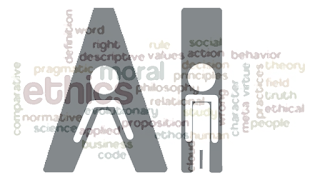Our everyday world and life is digital. Permanent networking with the environment changes our lives in all areas. But what happens to us when we are always online, reachable, when the boundaries between online and offline - also due to technologies such as augmented reality - become increasingly blurred? and even the word blurred does not suit anymore - the boundaries between online and offline are in a few cases not indiscernible.
From my view point, my ethical view point - I have to admit that as designer there are more than two hearts and mind in my soul - of view of digital ethics, the core question is what a 'good' life (you name it what 'good' means to you - nothing is more individual and personal than life - please have a look at my other blog where I mainly write about awareness, emotions between life and death) ... what a 'good' life in these days can look like and mean. A drastic and far-reaching change is brought by the digitization - private information, data, behavior is public, is analyzable ... .The variety, the 'richness' and range of private data and personal information, its analysis and use has never been easier.
The price we pay for the achievements of a digitized world is the digitization of privacy. The people can no longer control who knows what about one or what happens to the collected data. Ultimately, this affects our world on so many levels and aspects.
I think the responsibility does not lie solely with 'someone' - the big brother. I firmly believe - It is of central importance that everyone, the user, the developers, designers, the people take responsibility for digital world where we live, interact, and for the future.
First of all, that means thinking about the consequences of your own actions on the internet, with the digital world. It's not just about the loss of control that occurs from the moment when we post an images, text or video. It's also about our interactions, communication, about acceptance and learning about ethical, respectful, empathic communication that apply quite naturally in "real" life, but have not yet become binding in virtual and digital space - or even quite the contrary - is getting lost or out of control.
Many people lose all sense of the impact their words can have on others once they are online. And the same is true for companies, and states, ...
The digitization and virtualization of our world requires ethical scope or call it idea, mindset or even rules - even I have my personal issues with rules - and we no longer only need these rules or framework, or idea only for people, we need such rules also for machines and artificial intelligence.
That is why we need, as I think an dfeel, digital ethics. And it would be important that not only the big brother, companies, and managers, but all people today have a basic idea of ethics and ethical aspects. So that everyone knows what they are doing or should not do.
Let us design for privacy, security and integrity and respect.
Let us not only be aware of ethical values such as trust, honesty, fairness, confidentiality and accountability, but also actively apply them in order to do what is right and make decisions that are beyond reproach.
If ever there was a need for ethics in digital transformation, it is now.

Comments
Post a Comment